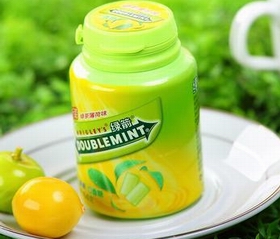 ith Wrigley gum sales declining in record numbers, marketers have been looking for new ways to appeal to gum chewers, especially children. On April 29th, Wrigley launched a new line of energy chewing gum called Alert. With each pellet of gum containing 40 milligrams of caffeine, (equivalent to a half cup of coffee), Wrigley's marketers knew they were onto the next big thing in energy products. Upon hearing the news, concerned groups, who know firsthand the deadly dangers of energy drinks, starting waving red flags. FDA regulators have responded as well, knowing full well the ill effects these easily chewable caffeine pellets could have on children. After hearing about Wrigley's release of Alert, the FDA opened up an investigation, pressuring the gum titan to look at how caffeinated gum may affect adolescents.
ith Wrigley gum sales declining in record numbers, marketers have been looking for new ways to appeal to gum chewers, especially children. On April 29th, Wrigley launched a new line of energy chewing gum called Alert. With each pellet of gum containing 40 milligrams of caffeine, (equivalent to a half cup of coffee), Wrigley's marketers knew they were onto the next big thing in energy products. Upon hearing the news, concerned groups, who know firsthand the deadly dangers of energy drinks, starting waving red flags. FDA regulators have responded as well, knowing full well the ill effects these easily chewable caffeine pellets could have on children. After hearing about Wrigley's release of Alert, the FDA opened up an investigation, pressuring the gum titan to look at how caffeinated gum may affect adolescents.Wrigley puts the brakes on their new energy gum
This pressure from the FDA prompted Wrigley to push the "pause" button on their marketing and sales of the new energy gum.
Casey Keller, Wrigley's president for North America, stated, "After discussions with the FDA, we have a greater appreciation for its concern about the proliferation of caffeine in the nation's food supply."
The shiny packaged gum, which was intended to be marketed alongside products like 5-hour energy shots, had cleared all legal guidelines, but this time officials are taking a second look, especially at how easily the gum could be abused by children.
In the past couple years, the American Academy of Pediatrics has been warning the public about the ill effects of caffeinated energy drinks, highlighting that fact that caffeine boosts heart rate, interferes with sleep, and increases anxiety.
Wrigley's North American president Casey Keller stated that the Alert Energy gum was marketed "in a safe and responsible manner to consumers 25 years and older." Still, after being pressured from the FDA, Keller believes that, "Changes [are needed] in the regulatory framework to better guide the consumers and the industry about the appropriate level and use of caffeinated products."
For now, the new Alert energy gum is on standby.
Michael Taylor, the FDA's deputy commissioner of foods, said "Wrigley's decision to stop production for now demonstrates real leadership and commitment to the public health. We hope others in the food industry will exercise similar restraint."
FDA examining energy drinks as well
So will energy drinks and 5-hour energy shots be put on standby soon?
In recent years, caffeine-laced foods have been growing in popularity. Food manufacturers have added caffeine to snack foods, nuts, and candy. For example, a line of Jelly Belly candies called "Extreme Sport Beans" contains 50 milligrams of caffeine in each small pack. These candies, gums, and snacks, when marketed to children, become a feeding ground for anything from anxiety to diabetes.
FDA's Taylor went on to say that the overall abundance of caffeine laced foods and drinks on the market is not what the FDA envisioned when it approved caffeine in soda back in the 50s. Nonetheless, all the recent caffeine products that have flooded the market have prompted the FDA to take a closer look at the way food ingredients are regulated altogether. They are currently investigating the safety of energy drinks and energy shots, which have been linked to death in recent years.
Will the FDA make it all safe?
Apparently a government agency cannot provide total security. The FDA has more so allowed caffeine to become a gateway drug. The FDA's stamp of approval of energy products makes these products look safe in the public's eye, but products like these can be more dangerous than some illegal "drugs".
In the end, the FDA will most likely come up with a way to make the caffeinated gum look safe for certain age groups. In the future, kids will get their hands on the energy gum either way as the FDA remains the gateway for legal drugs.







